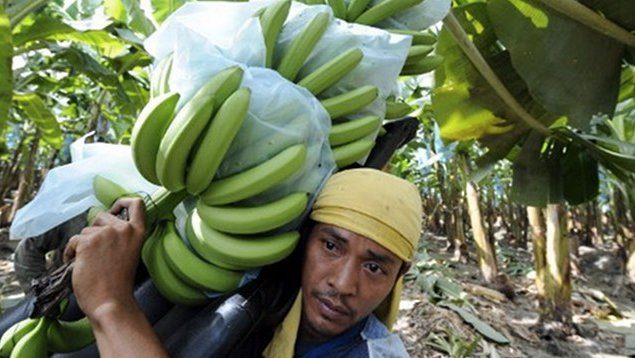SUMMARY
This is AI generated summarization, which may have errors. For context, always refer to the full article.

MANILA, Philippines – The Philippines again urged Australia to end its “overly stringent” export requirements that have been barring local banana growers from entering the Land Down Under for two decades.
Philippine Finance Secretary Carlos Dominguez III, who was once an agriculture chief, raised the Philippines’ long-standing concern in his meeting with Australian Foreign Minister Julie Bishop, who was in Manila last March 16-17 on an official visit.
“As former Minister of Agriculture, I will raise with you the issue of the banana imports. We have been working at that for 20 years, probably. And we have not been able to ship to you a single box of bananas,” Dominguez was quoted as saying in his meeting with Bishop.
Biosecurity Australia, the inspection and quarantine assessment arm of Australia’s Department of Agriculture, has long been imposing stringent phytosanitary and sanitary requirements on Philippine bananas, which have been barred from the Australian market since 1995.
These requirements include the need for Philippine banana exports to have 8 leaves prior to harvest as well as the use of non-perforated bags for packing.
The Australian Banana Growers Council has long been opposing banana imports from the Philippines. (READ: Banana, anyone? Philippines seeks other export markets)
The Philippine Department of Finance (DOF) said in a statement on Sunday, March 26, that Bishop replied by reiterating the need for the Philippines to meet Australia’s risk management measures. Australia’s top diplomat also offered assistance.
“The challenge, I guess with you and for us is for Philippine produce to be able to meet those conditions in order for exports to occur,” Bishop was quoted as saying.
“We can continue to talk about… more assistance that we can provide to meet those requirements,” she added.
In Australia, bananas are the number one selling supermarket product and the second biggest national horticulture industry after citrus, Australia’s Department of Agriculture said on its website.
Balance of trade favors Australia
Opening up the Australian market will help the Philippines boost its banana exports, which have plummeted by 61.3% to $439.9 million for 2015.
As a banana supplier in 2015, the Philippines fell to 6th place behind Ecuador, Belgium, Costa Rica, Guatemala, and the United States, from 3rd place in 2014.
Dominguez pointed out to Bishop that Philippine bananas, one of the country’s top food exports, are accepted by many other countries.
“Japan accepts our bananas, China accepts our bananas, even the Middle East accepts our bananas,” he said.
In July 2003, the Philippines asked the World Trade Organization to create a dispute panel to settle its complaint with Australia regarding banana exports.
DOF officials have argued that Australia’s measures are “inconsistent” with provisions of the General Agreement on Tariffs and Trade (GATT), barring countries that are signatories to the pact from imposing non-tariff trade barriers.
The balance of trade between the two countries heavily favors Australia, with Philippine imports from Australia reaching $892 million in 2016, while exports amounted to only $386 million in the same year. – Rappler.com
Add a comment
How does this make you feel?
There are no comments yet. Add your comment to start the conversation.